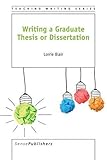Writing a graduate thesis or dissertation / Lorrie Blair.
Material type: TextSeries: Teaching writing (Sense Publishers) ; v. 4.Publisher: Rotterdam : Sense Publishers, 2016Description: xx, 145 pages ; 24 cmContent type:
TextSeries: Teaching writing (Sense Publishers) ; v. 4.Publisher: Rotterdam : Sense Publishers, 2016Description: xx, 145 pages ; 24 cmContent type: - text
- unmediated
- volume
- 9789463004244
- 808 BL.W 2016 23
| Item type | Current library | Collection | Call number | Status | Date due | Barcode | |
|---|---|---|---|---|---|---|---|
|
|
The Knowledge Hub Library | Design Media | 808 BL.W 2016 (Browse shelf(Opens below)) | Not For Loan | 211945 | ||
|
|
The Knowledge Hub Library | Design Media | 808 BL.W 2016 (Browse shelf(Opens below)) | Not For Loan | 211523 |
Includes bibliographical references (pages 135-144).
Acknowledgments -- Introduction -- What Is a Thesis? -- Thesis Formats -- Monographs -- Thesis by Publication -- Professional Doctorates -- Thesis and a Creative Project -- Alternative Forms -- Finding the Right Supervisor -- Introduction -- Who Are Supervisors? -- Student Needs -- Qualities to Look for in a Supervisor -- The Institutional Context of Supervision -- Cultural Diversity -- Finding the "Just Right" Supervisor -- Supervisors to Avoid -- Co-Supervision -- The Thesis Committee -- Writing the Proposal -- Introduction -- Overcoming Fear -- Working Independently -- Developing or Joining a Community of Practice (CoP) -- Working with the Supervisor -- Finding a Thesis Topic and Formulating a Research Question -- Finding a Research Topic and Methodology -- Components of the Proposal -- Conducting and Writing Literature Reviews -- Introduction -- Types of Literature Reviews -- Locating and Evaluating Research -- But Is It Research? -- Where to Start and When to Stop -- Writing the Review -- Common Mistakes Made in Literature Reviews -- Stringing and Dumping -- Maintaining Academic Integrity -- Introduction -- How Can Plagiarism Be Prevented? -- What Happens If You Are Charged with Plagiarism? -- Choosing a Methodology -- Introduction -- Epistemology -- The Methodology -- Method -- Quantitative Research -- Experimental Research -- Quasi-Experimental Research -- Nonexperimental Research -- Criteria for Judgment for Quantitative Research -- Qualitative Research -- Ethnography -- Phenomenology -- Narrative Research -- Grounded Theory -- Case Study -- Choosing among the Methods -- Criteria for Judgment for Qualitative Research -- Student Challenges -- Action Research -- Student Challenges -- Why Do Action Research? -- Arts Methodologies and Methods -- As Art Therapy -- As Social Science Research -- As Studio Art Practice -- How Does One Judge the Quality of Arts Research? -- Why Conduct Art Research -- Writing the Methodology Section or Chapter -- Conducting Ethical Research -- Introduction -- Who and What Govern the Ethics Policies and Procedures? -- What Power Do Research Ethics Boards Have? -- Navigating Human Subjects Research Protocol Forms -- Consent Forms -- Multi-Jurisdiction Research -- Methodological Considerations -- Action Research -- Ethics and Self-Reflective Research -- Internet Research -- Online Surveys -- Ethical Consideration for Creative Research Practices -- Collecting and Analyzing Data -- Collecting Data -- Recruiting and Retaining Participants -- Dealing with Unanticipated Ethical Issues -- Losing the Data -- Faulty Data -- Conclusion -- Data Analysis -- Starting Points -- Coding the Data -- Computer Assisted Qualitative Data Analysis Software (CAQDAS) -- Interpreting the Data -- Establishing an Academic Track Record -- Presenting at Conferences -- Presenting at Conferences -- Before Submitting a Proposal -- How to Write a Conference Proposal -- How to Make a Conference Presentation -- How to Attend Presentations and Network -- How to Publish a Journal Article -- Selecting the Appropriate Journal -- Understanding the Peer-Review Process -- What Is an Author? -- The Order of Authors -- How to Submit a Paper -- How to Deal with Reviewers' Comments -- Why Papers Are Rejected -- Finding Support for Writing the Thesis -- Introduction -- Time -- Writing Support -- Motivation -- How to Meet with a Supervisor -- How to Ensure Good Feedback -- Conclusion -- Dealing with Student-Supervisor Problems -- Introduction -- Addressing Problems with Your Supervisor -- Getting Effective Feedback from Your Supervisor -- Making a Formal Complaint -- Changing Supervisors -- Sexual Harassment, Racism, Homophobia, and Discrimination -- Defending the Thesis -- Introduction -- What Is the "Good Enough" Thesis? -- What Does an Oral Examination Entail? -- References -- About the Author.
Blair's practical book gives graduate students the tools they need to successfully plan, write, and defend their thesis or dissertation. Each chapter addresses a rite of passage common to most graduate programs: selecting a methodology, conducting a literature search, carrying out research, analyzing data, and preparing for a thesis defense. Combining years of supervisory experience with up-to-date research, Blair addresses issues important to graduate students that are often left out of these guides, including how to navigate the ethics review process and avoid problems related to academic integrity, such as plagiarism, how to select and prepare for a productive meeting with a supervisor, and how to establish an academic track record by presenting research at conferences and publishing in academic journals. Writing a Graduate Thesis or Dissertation offers much more than its title suggests. It is a thorough and succinct guide to succeeding in graduate school, appropriate for thesis and research methods courses, and a must-read for graduate students across the disciplines.
There are no comments on this title.

